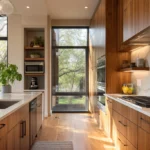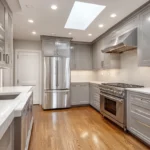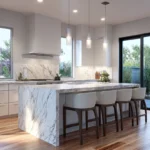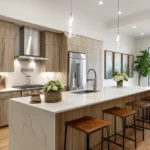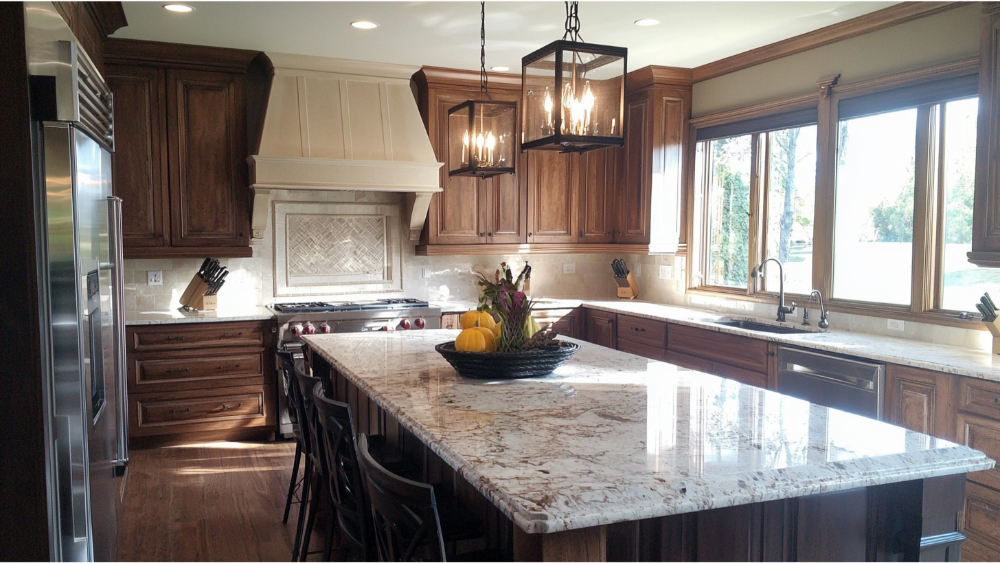
Adding texture to your kitchen can transform the space into a warm and inviting area that reflects your personal style. Texture as simple as kitchen island decor brings depth and character, creating visual interest and enhancing the overall aesthetic. Whether through the use of diverse materials like wood, stone, or textiles, or by incorporating unique decorative elements, there are countless ways to elevate your kitchen design.
In this guide, we will explore creative methods to introduce texture, ensuring your kitchen is not only functional but also a beautiful representation of your taste.
Key Materials for Adding Texture
To effectively incorporate texture into your kitchen, consider the following materials:
1 | Countertops
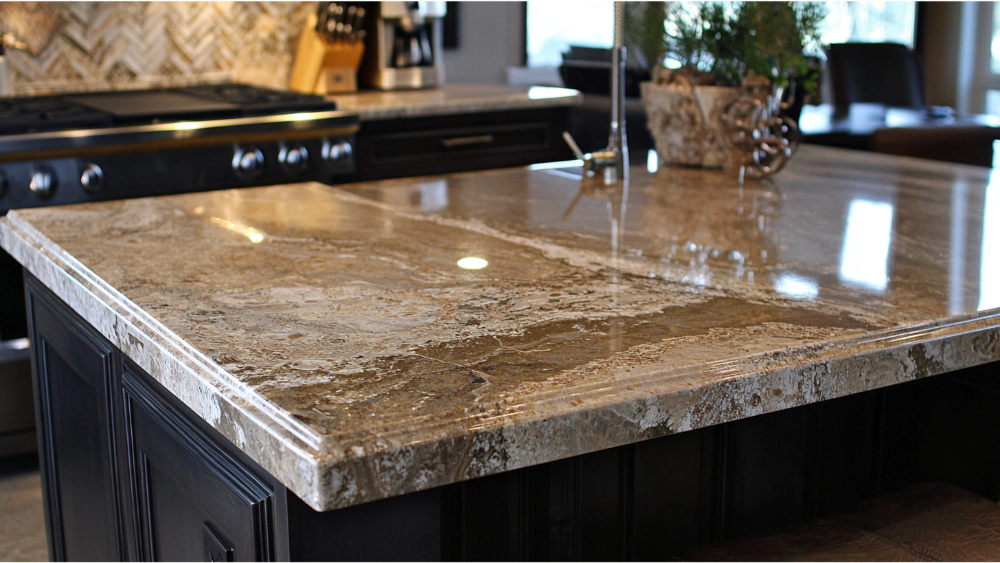
When selecting countertops, there are various options to consider, each offering unique benefits and aesthetics. Concrete provides a modern, industrial look with endless customization possibilities, while recycled glass offers an eco-friendly choice that dazzles with colorful flecks. Granite and quartz are popular for their polished finishes and durability, making them ideal for busy kitchens.
Countertops play a crucial role in establishing texture and style in your kitchen. Natural stones like granite and quartz offer a polished finish with natural variations that enhance visual depth, while butcher block countertops provide a warm, organic feel that invites interaction.
To choose natural materials like stone not only elevates the aesthetic but also ensures durability and timeless charm. For a more rustic look, consider using reclaimed wood, which adds texture and brings a story to your kitchen. The choice of countertop can significantly influence the overall ambiance, making it essential to select a material that complements your design vision.
2 | Textured Tiles
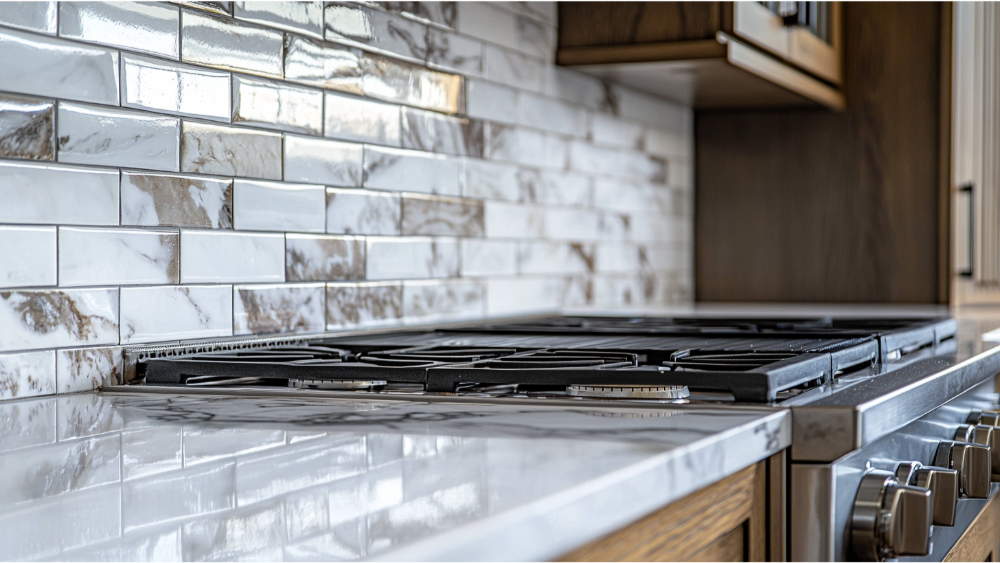
Textured tiles can dramatically elevate the aesthetic of your kitchen, offering both visual and tactile interest. Available in various materials, including ceramic, porcelain, and glass, these tiles can feature intricate patterns, grooves, or raised designs that capture light in captivating ways.
Incorporating kitchen texture as a backsplash or flooring choice not only enhances the overall design but also adds functional benefits, such as improved grip underfoot. Texture adds depth whether you opt for a subtle texture or a bold statement piece, these tiles provide a versatile solution to enrich your kitchen’s atmosphere.
3 | Lighting Fixtures
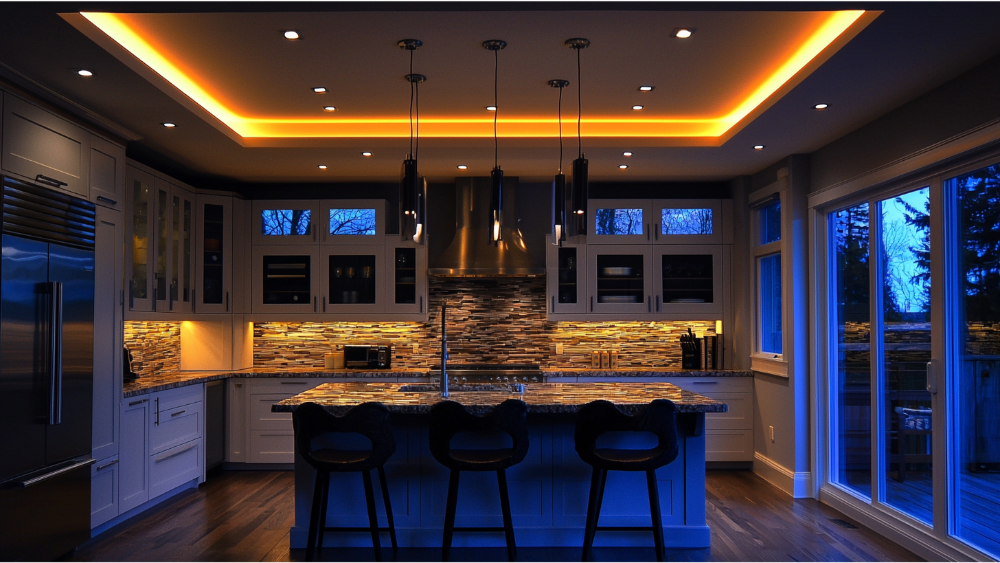
Lighting fixtures are essential for adding texture and ambiance to your kitchen space. They come in various styles, from rustic pendant lights to sleek modern chandeliers, each contributing to the overall design.
Textured metals or glass shades can create interesting shadows and reflections, enhancing the visual appeal. Strategically placed lighting can highlight textured surfaces, such as countertops and tiles, bringing depth and warmth to your kitchen’s atmosphere.
4 | Wood Accents
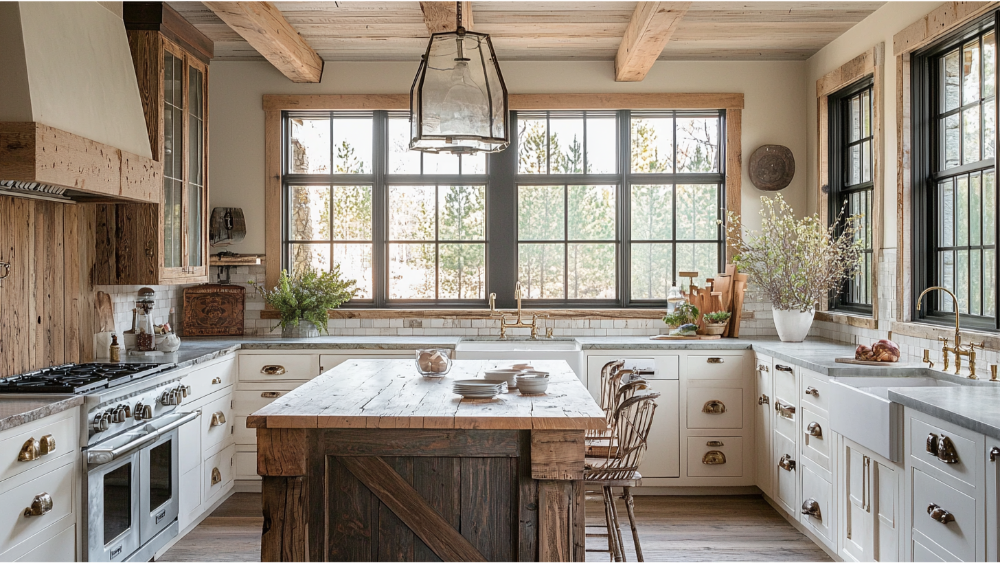
Natural wood accents are a fantastic way to introduce warmth and a natural touch to your kitchen design. Whether through exposed beams, wooden shelves, or decorative stools, these elements can create a seamless flow between the kitchen and adjacent living spaces.
Choose wood materials to enhance this effect. Using different wood finishes—such as distressed, polished, or reclaimed—adds layers of texture and character, making the space feel both inviting and stylish. Natural wood accents can complement other materials, like stone and metal, to create a balanced and harmonious aesthetic.
5 | Textiles
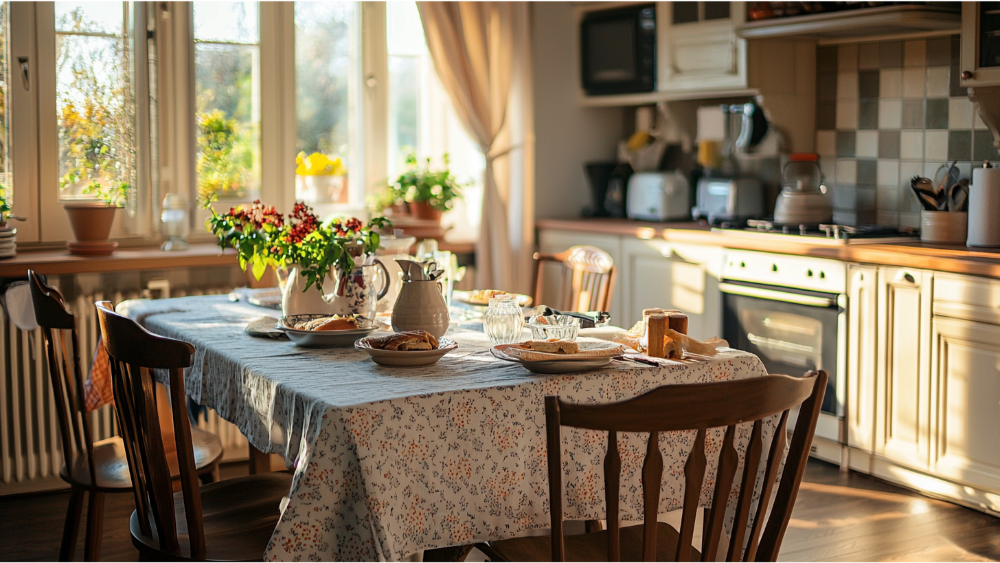
Textiles play a vital role in softening the hard surfaces often found in kitchen designs, adding comfort and warmth to the space. Items such as table linens, curtains, and cushions can introduce color, pattern, and texture, creating a balanced visual atmosphere.
Add visual interest by integrating natural fabrics like cotton, linen, or jute can enhance the organic feel of the kitchen, while printed or patterned textiles can serve as focal points that draw the eye. By selecting the right textiles, you can easily and affordably transform your kitchen into a cozy and stylish gathering place.
6 | Metal Elements
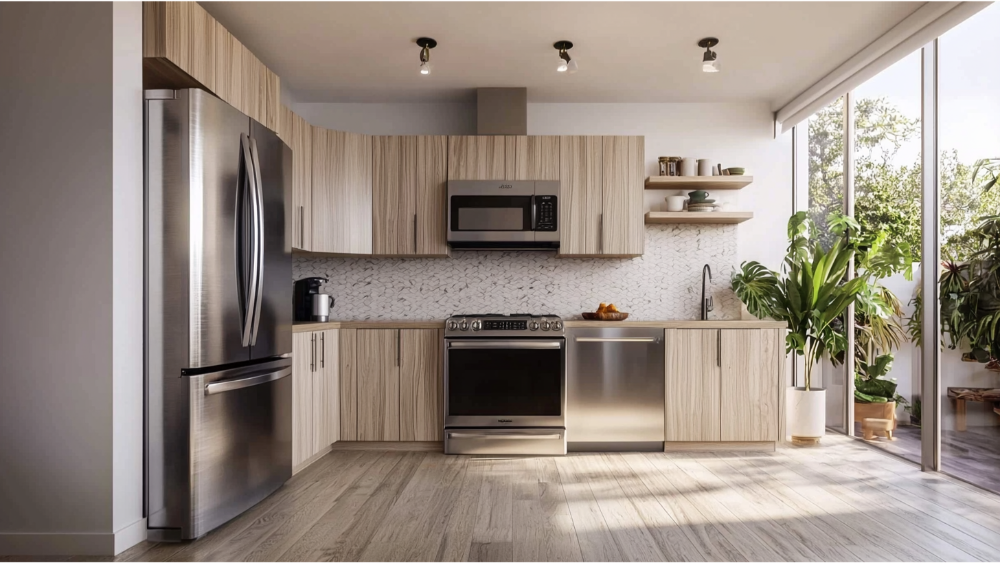
Metal elements can infuse a contemporary edge while adding texture and shine to your kitchen design. Incorporating materials such as brass, copper, or even stainless steel not only enhances visual contrast but also creates a sense of sophistication.
Consider using metal in hardware, fixtures, or even decorative accents to draw attention and complement other textures in the space. The reflective nature of metals can help to brighten the kitchen while contributing to an overall modern aesthetic.
Remodeling for Texture Enhancement
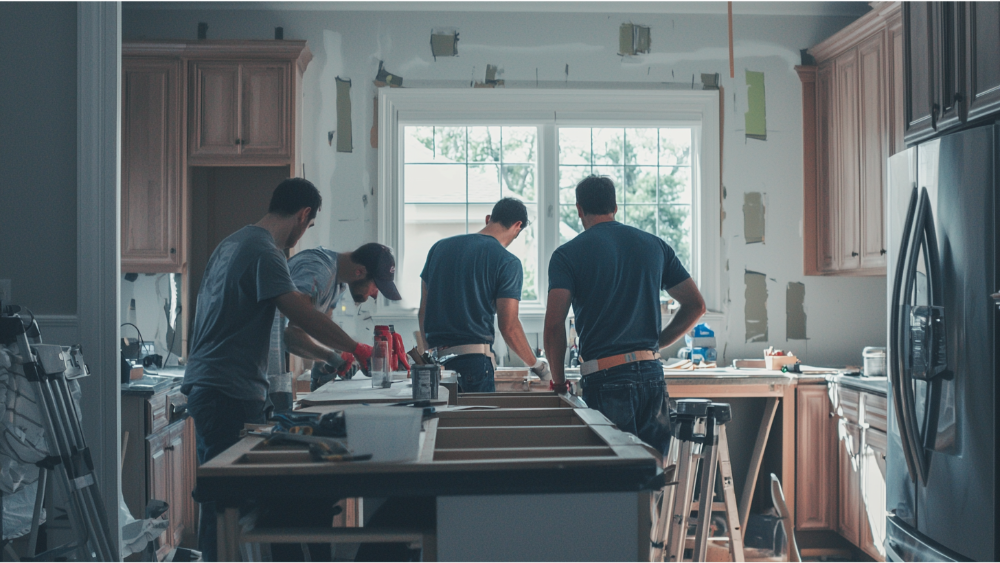
Remodeling your kitchen is an excellent opportunity to add texture, whether you choose a full remodel or simpler updates. By thoughtfully selecting materials and elements during the remodel, you can achieve a dynamic visual appeal that enriches your culinary space. America’s Advantage Remodeling stands out as the premier choice for such endeavors, offering unparalleled expertise and a commitment to quality. Their skilled team understands the nuances of design and construction, ensuring that every detail contributes to a textured and inviting kitchen. Here are some reasons why they are the best choice for your remodeling project:
Expertise and Experience
America’s Advantage Remodeling boasts 20 years of experience in kitchen design and renovation. ensuring that they can navigate the complexities of various projects with ease. Their team of skilled professionals brings a wealth of knowledge, allowing them to offer tailored solutions that perfectly align with your vision and elevate the texture of your space.
Personalized Design Solutions
At America’s Advantage Remodeling, personalized design solutions are crafted to meet the unique preferences and needs of each client. By closely collaborating with homeowners, they ensure that every aspect of the kitchen reflects individual style while enhancing functionality and texture, resulting in a space that truly feels like home.
Quality Materials
Utilizing quality materials is essential in enhancing both the aesthetic appeal and durability of your kitchen. America’s Advantage Remodeling carefully sources premium materials that not only add texture but also ensure longevity, making your kitchen a beautiful and functional space for years to come.
Attention to Detail
Attention to detail is a hallmark of America’s Advantage Remodeling, where every aspect of the kitchen is meticulously considered. From precise measurements and impeccable finishes to the thoughtful selection of textures, their commitment to detail ensures that the final result is not only visually stunning but also harmonious and functional.
Customer Satisfaction
Customer satisfaction is a top priority for America’s Advantage Remodeling, as they strive to exceed expectations at every stage of the remodeling process. Their dedication to clear communication and responsiveness ensures that clients feel valued and involved, resulting in a finished kitchen that truly embodies their dreams and needs.
Texturizing With a Kitchen Remodel
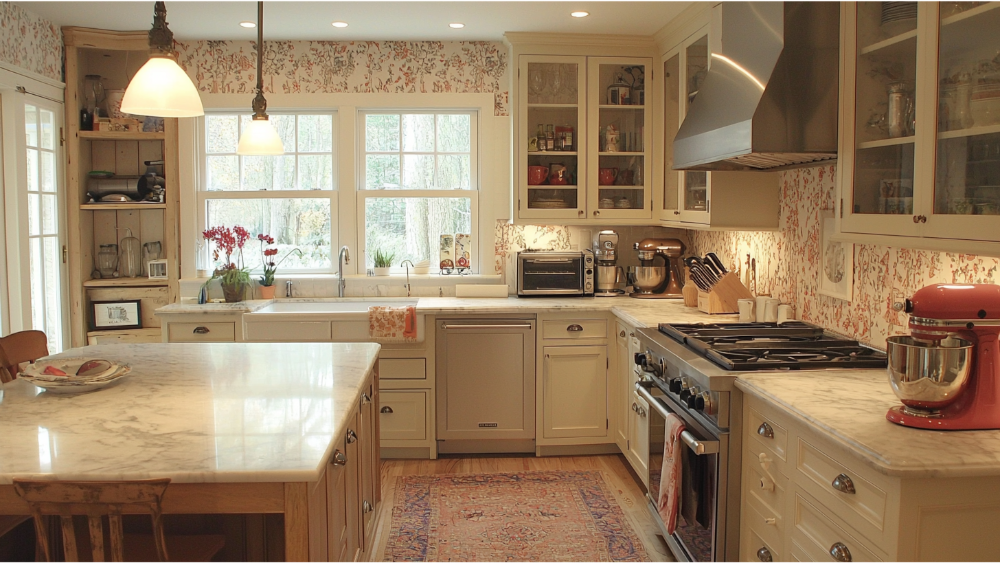
When embarking on a kitchen remodel, it’s essential to consider how texture can transform the space and create a more inviting atmosphere. A thoughtfully designed kitchen not only boosts functionality but also enhances the overall aesthetic through the strategic use of various materials and finishes. By incorporating diverse textures, you can elevate your kitchen into a warm and stylish environment that reflects your personal style.
Textured Wallpaper
Textured wallpaper can dramatically change the visual landscape of your kitchen. It adds depth and interest to walls, breaking the monotony of flat surfaces. In interior design, incorporating wallpaper with tactile elements can create focal points and serve as a backdrop for other design features, adding warmth and personality to the space.
Layered Lighting Fixtures
Choosing layered lighting fixtures, such as pendant lamps and sconces, can introduce various textures through different materials. Mixing glass, metal, and wood allows for dynamic shadow play and highlights, enriching the overall aesthetic. This is vital in interior design as it not only improves function but also accentuates textured surfaces throughout the kitchen.
Textured Backsplash Materials
Incorporating materials like subway tiles, natural stone, or mosaic designs for the backsplash can significantly enhance the texture of your kitchen. These elements provide visual contrast and can seamlessly blend various design styles, making them a critical aspect of interior design. A well-selected backsplash can be a striking feature that ties the whole kitchen together.
Wooden Cabinetry with Distressed Finishes
Opting for wooden cabinetry with a distressed or reclaimed finish provides depth and character. This approach can create a rustic charm and add a tactile element that stark, modern finishes may lack. In the realm of interior design, such cabinetry serves as a conversation starter and reinforces the kitchen’s functionality and style.
Woven Textiles and Rugs
Incorporating woven textiles, such as jute rugs or textured table linens, softens hard surfaces and adds a layer of comfort. These elements are essential in interior design, as they provide warmth and a sense of coziness, making the kitchen feel inviting. Textiles serve as an easy way to introduce color and patterns that enhance the overall texture of the space.
Frequently Asked How to Add Texture to Your Kitchen Questions
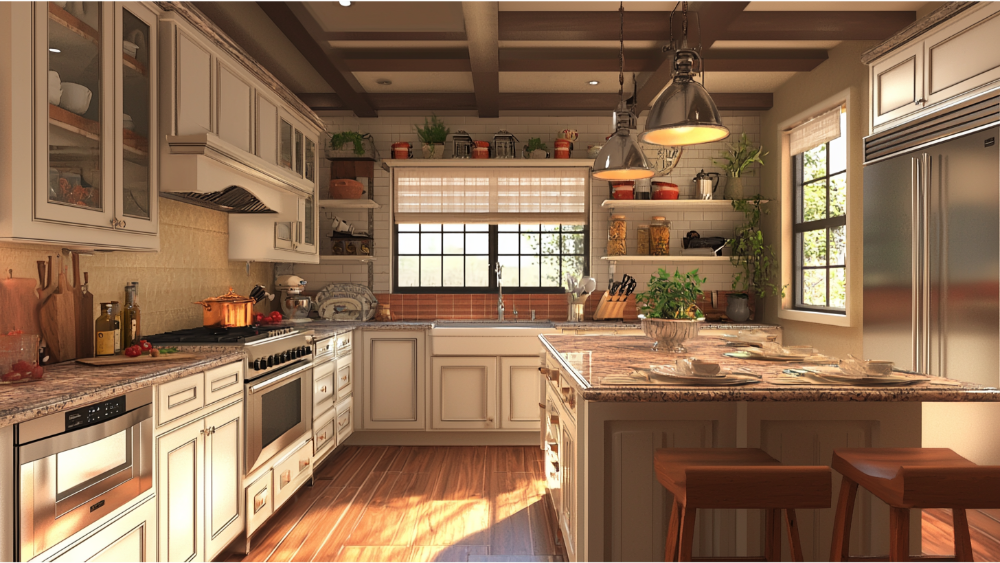
Should Kitchen Walls Be Textured?
Texturing kitchen walls can significantly enhance the overall look and feel of the space, offering an opportunity to infuse personality and depth into the design. Textured walls can hide imperfections, create visual interest, and complement other design elements in the kitchen. Consideration should be given to the choice of texture; options like plaster, textured paint, or brick wall wallpaper can all contribute to a unique atmosphere.
Additionally, textured walls can assist in breaking up flat surfaces, particularly in kitchens with an abundance of cabinetry and appliances. Whether to texture kitchen walls depends on your aesthetic goals and how it harmonizes with the rest of the interior design elements in the space.
Can You Texture Kitchen Cabinets?
Yes, you can texture kitchen cabinets, and doing so can significantly enhance the overall design and character of your kitchen. Texturing options for cabinets include techniques such as distressing, glazing, or adding patterned finishes. Distressing involves sanding down surfaces to create a weathered look, while glazing adds a translucent top coat that emphasizes the wood grain and imperfections.
Using textured paint or overlay materials can introduce interesting tactile elements. These finishes not only contribute depth and style but also allow homeowners to personalize their kitchens, making the space uniquely their own while seamlessly integrating with the overall design theme.
How Can I Add Softness to My Kitchen?
To add softness to your kitchen, consider incorporating elements such as plush textiles, gentle color palettes, and rounded furnishings. Softening the space can be achieved with the addition of cushioned dining chairs or bar stools, along with soft, flowing curtains that allow natural light to filter through while enhancing the room’s warmth. Accents like decorative pillows or a cozy throw can further contribute to a welcoming ambiance, making the kitchen feel more inviting and comfortable for family and guests.
Conclusion
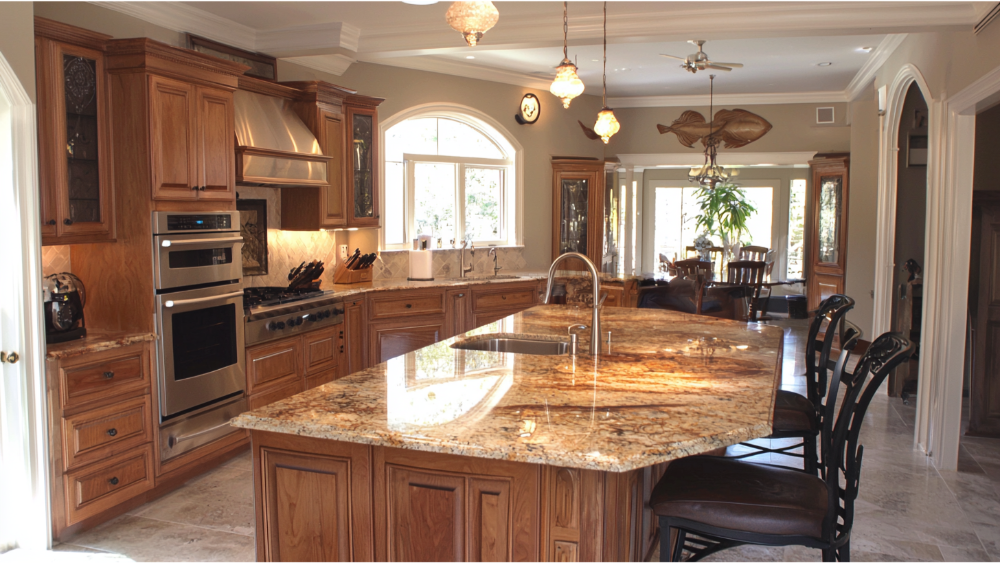
Incorporating texture into your kitchen remodel is not just about aesthetics; it’s about creating a space that embodies warmth, personality, and functionality. By thoughtfully selecting materials, finishes, and design elements, you can transform your kitchen into a captivating environment that truly reflects your style and enhances your culinary experience. Whether through textured wallpapers, layered lighting, or cozy textiles, each choice contributes to an inviting atmosphere that makes your kitchen the heart of your home. Ultimately, a well-designed kitchen, rich in texture, serves as an ideal backdrop for both everyday meals and memorable gatherings, proving that style and practicality can beautifully coexist.
CONTACT US
Our Services
Areas We Serve
Certificate

